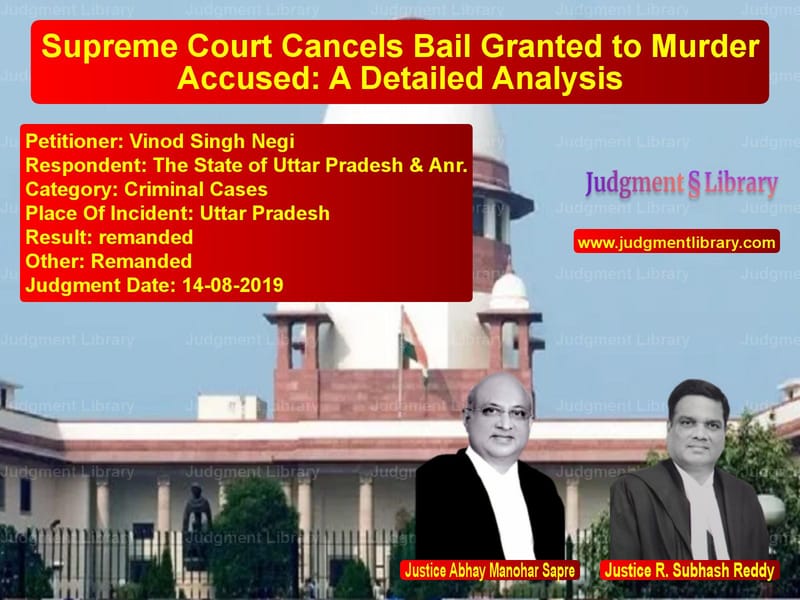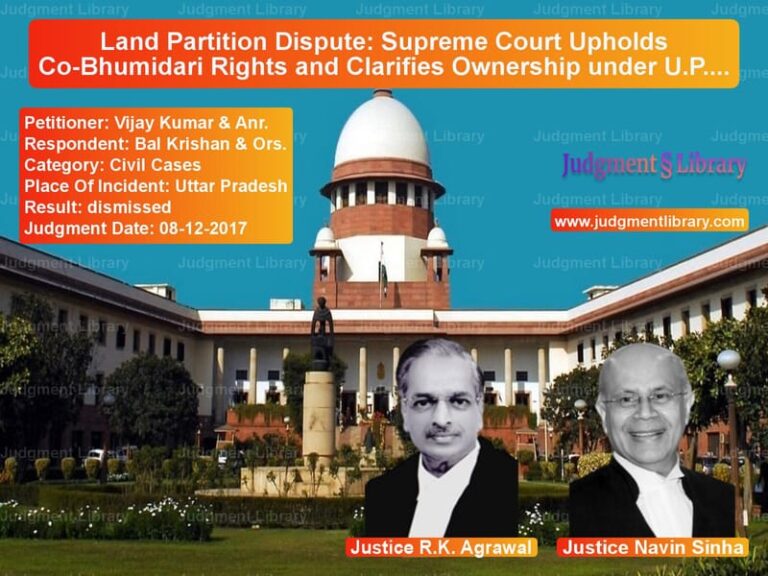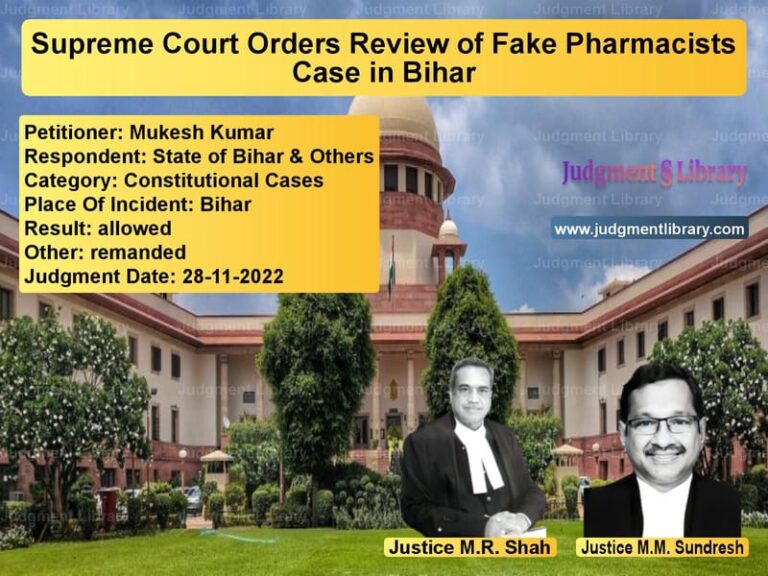Supreme Court Cancels Bail Granted to Murder Accused: A Detailed Analysis
In a significant ruling on August 14, 2019, the Supreme Court of India, in the case of Vinod Singh Negi v. The State of Uttar Pradesh & Anr., examined whether the Allahabad High Court was justified in granting bail to three accused convicted for the murder of Manoj. The Supreme Court ultimately set aside the High Court’s order and remanded the case for fresh consideration, citing a lack of reasoning and failure to account for the criminal background of the accused.
The case raised crucial legal questions regarding bail in murder cases, particularly when the accused have been sentenced to life imprisonment. The decision reaffirmed the principle that bail in serious offenses must be granted only after a detailed examination of facts, precedents, and the accused’s background.
Background of the Case
The case involved the murder of one Manoj, for which three individuals—Umesh Sharma, Ashok, and Parvinder Singh—were prosecuted. The Additional Sessions Judge/Special Judge (E.C. Act), Ghaziabad, convicted them under Section 302/34 of the Indian Penal Code (IPC) and sentenced them to life imprisonment along with a fine of ₹50,000 each.
During the pendency of their appeals before the Allahabad High Court, the accused applied for bail. The High Court granted their applications and suspended their sentences. Aggrieved by this, the complainant, Vinod Singh Negi, filed an appeal before the Supreme Court, challenging the bail order.
Petitioner’s Arguments
The complainant, Vinod Singh Negi, who is also the brother of the deceased, contended that the High Court erred in granting bail and suspending the sentence of life imprisonment without adequate justification. The key arguments presented were:
- Failure to Assign Reasons: The High Court did not provide specific reasons for granting bail to the accused despite the serious nature of the offense.
- Gravity of the Offense: The petitioner highlighted that the accused were convicted for murder under Section 302 IPC, which warrants severe punishment. Granting bail in such cases requires an exceptional justification, which was missing in the High Court’s order.
- Criminal Background of the Accused: New evidence had surfaced indicating the accused’s involvement in other criminal activities, which was overlooked by the High Court.
- Violation of Established Legal Principles: The petitioner argued that the High Court ignored Supreme Court precedents that emphasize the need for caution in granting bail in cases involving heinous crimes.
Respondent’s Arguments
The accused (respondents) defended the bail order on the following grounds:
- Long Duration of Imprisonment: The accused had already spent a substantial period in custody.
- Strong Case for Acquittal: They claimed that their conviction was based on weak evidence, and their appeals had a high probability of success.
- Right to Bail: Bail is a fundamental right, and keeping them in custody indefinitely without considering their appeal would be unjust.
Supreme Court’s Observations
The Supreme Court, after a detailed examination of the case, made the following key observations:
1. Lack of Reasons for Granting Bail
The Court stressed that bail in serious offenses like murder must be granted only with due consideration and clear reasoning. The judgment stated:
“The High Court has not assigned any reason for the grant of bail. The application for bail/suspension of sentence must be decided based on well-established principles.”
The Court referred to past precedents, including Ajay Kumar Sharma v. State of U.P. and Dataram Singh v. State of U.P., which emphasized that granting bail in serious offenses requires a careful balancing of individual rights and public interest.
2. Ignoring the Criminal Background of the Accused
The Supreme Court noted that additional evidence had emerged showing that the accused were involved in multiple criminal cases. Some of these cases were registered even before the grant of bail, while others were filed afterward. The judgment stated:
“The list of cases pending against the accused clearly indicates their involvement in multiple criminal activities. The High Court failed to consider these crucial facts.”
The Court held that this oversight justified setting aside the bail order and sending the matter back to the High Court for fresh adjudication.
3. Failure to Follow Legal Precedents
The Supreme Court found that the High Court had ignored well-established guidelines for granting bail in murder cases. The Court cited the judgments in Lokesh Singh v. State of U.P. and Mauji Ram v. State of U.P., which mandated a cautious approach when granting bail in cases of heinous crimes.
Final Verdict
In conclusion, the Supreme Court allowed the appeal and set aside the bail order. The case was remanded to the Allahabad High Court for fresh consideration, with specific instructions:
- The High Court must reassess the bail applications based on merits, keeping in mind the gravity of the offense.
- The accused’s criminal history should be examined in detail.
- The Court must provide detailed reasoning if it decides to grant bail again.
The Supreme Court further directed the accused to surrender immediately and canceled their bail bonds.
Impact of the Judgment
This judgment has significant implications for the judicial approach toward bail in serious criminal cases:
- Stricter Scrutiny in Bail Matters: Courts must ensure that bail is granted only with proper reasoning, especially in cases involving life imprisonment.
- Consideration of Criminal Background: This ruling underscores the importance of evaluating an accused’s past criminal record before deciding on bail.
- Reaffirmation of Legal Precedents: The judgment reinforces past Supreme Court rulings that stress the need for a cautious approach in bail matters.
Conclusion
The Supreme Court’s ruling in Vinod Singh Negi v. The State of Uttar Pradesh serves as a crucial precedent in bail jurisprudence for serious offenses. By setting aside the High Court’s bail order and remanding the case for fresh consideration, the judgment ensures that due process is followed while granting bail in murder cases. The ruling sends a strong message that bail in serious offenses must be based on sound legal principles, not arbitrary decisions.
Moving forward, this decision is expected to shape how lower courts handle bail applications in cases involving heinous crimes. It also acts as a safeguard against the premature release of individuals convicted of grave offenses, ensuring that justice is served while maintaining fairness in legal proceedings.
Petitioner Name: Vinod Singh Negi.Respondent Name: The State of Uttar Pradesh & Anr..Judgment By: Justice Abhay Manohar Sapre, Justice R. Subhash Reddy.Place Of Incident: Uttar Pradesh.Judgment Date: 14-08-2019.
Don’t miss out on the full details! Download the complete judgment in PDF format below and gain valuable insights instantly!
Download Judgment: Vinod Singh Negi vs The State of Uttar P Supreme Court of India Judgment Dated 14-08-2019.pdf
Direct Downlaod Judgment: Direct downlaod this Judgment
See all petitions in Murder Cases
See all petitions in Bail and Anticipatory Bail
See all petitions in Attempt to Murder Cases
See all petitions in Judgment by Abhay Manohar Sapre
See all petitions in Judgment by R. Subhash Reddy
See all petitions in Remanded
See all petitions in Remanded
See all petitions in supreme court of India judgments August 2019
See all petitions in 2019 judgments
See all posts in Criminal Cases Category
See all allowed petitions in Criminal Cases Category
See all Dismissed petitions in Criminal Cases Category
See all partially allowed petitions in Criminal Cases Category







